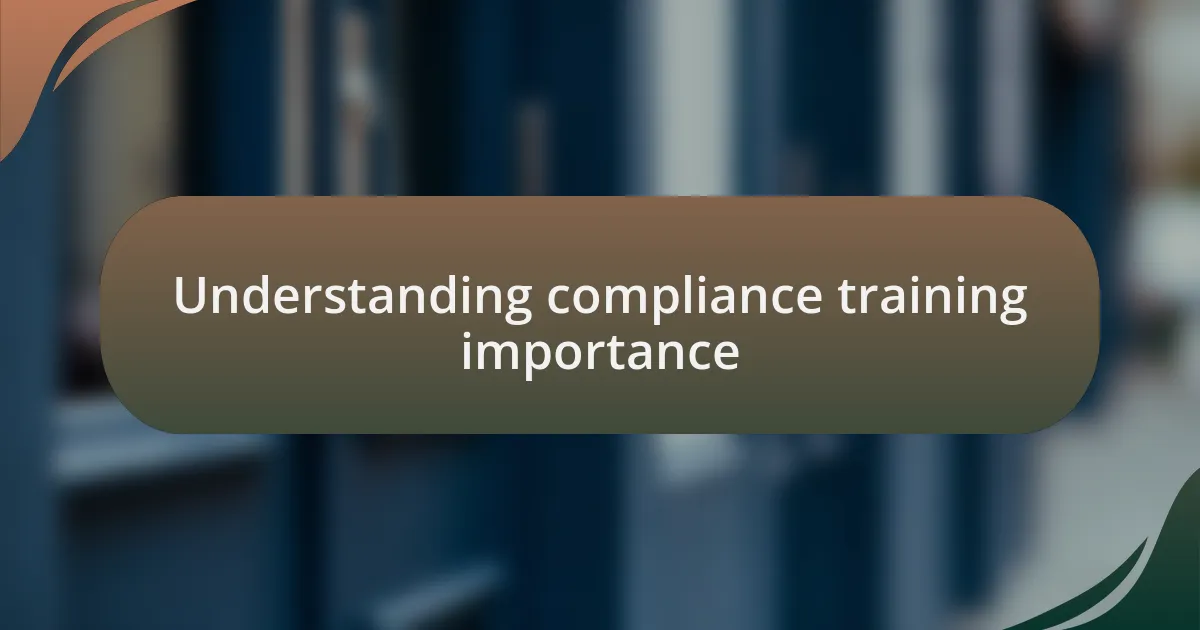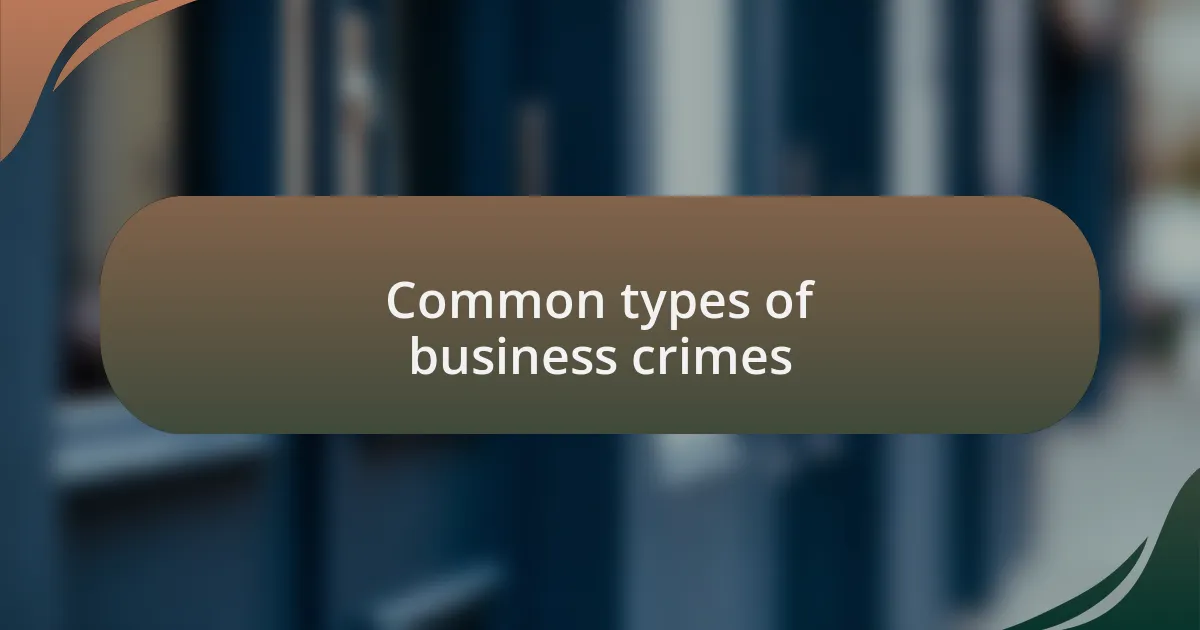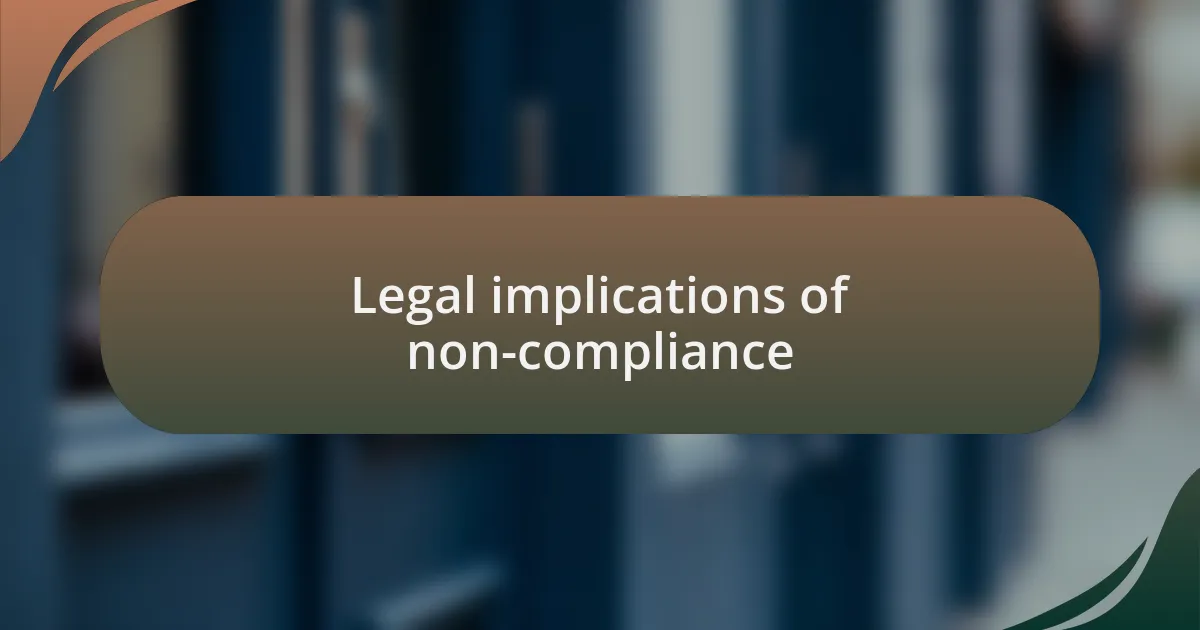Key takeaways:
- Compliance training establishes a culture of integrity, accountability, and transparency within organizations, protecting both assets and reputation.
- Understanding business crimes such as embezzlement, fraud, and cybercrime is essential for implementing effective preventative measures.
- Non-compliance can lead to severe legal consequences, including hefty fines, criminal charges, and civil lawsuits, impacting not only companies but also individuals and communities.
- Practical applications of compliance principles, like open discussions and real-life stories, embed ethical decision-making into daily operations and empower employees to take accountability.

Understanding compliance training importance
Compliance training is essential because it lays the foundation for a culture of integrity within an organization. I remember attending my first training session, feeling a mixture of skepticism and curiosity. But as I learned about the consequences of non-compliance, I could see firsthand how these guidelines protect the entire team, making me realize that it’s not just about rules, but about trust.
When I think about compliance training, I often reflect on its role in safeguarding not only the company’s assets but also its reputation. Have you ever considered the impact that a single compliance failure can have on employee morale? During one session, a case study was shared where a lapse in compliance led to devastating repercussions, reminding us all of how interconnected our actions are. It was eye-opening to realize that each of us has a role in maintaining standards.
Moreover, compliance training fosters accountability and transparency, essential qualities in today’s business landscape. I found it particularly engaging when a trainer encouraged us to share our own compliance dilemmas, creating an open dialogue. It made me appreciate that compliance isn’t just a checklist; it’s a collective commitment to ethical practices that can empower us in making better decisions every day.

Common types of business crimes
Business crimes come in various forms, and it’s essential to recognize them to effectively prevent their occurrence. One common type is embezzlement, where an employee misappropriates funds entrusted to them, often in subtle ways. I remember a colleague sharing a story about a small company that lost a significant amount of money because someone they trusted exploited their access. It highlighted for me how critical internal controls are in safeguarding a business’s financial health.
Another prevalent crime is fraud, particularly in the form of financial statement manipulation. It’s alarming how some individuals might alter company documents to misrepresent the financial status for personal gain. I’ve seen discussions unfold during training where we questioned what drives someone to commit such acts. This exploration opened my eyes to not only the legal ramifications but also the moral implications of misleading others in a professional setting.
Lastly, cybercrime is becoming increasingly prevalent in today’s digital landscape. From phishing schemes to data breaches, businesses face a constant threat that can tarnish reputations and result in financial losses. I recall an incident shared during training where a well-known organization fell victim to a cyber attack, leading to significant disruptions. It made me ponder, how can we as employees contribute to a safer digital environment? This ongoing conversation about cyber awareness has reshaped my perspective on compliance and personal responsibility in preventing such crimes.

Legal implications of non-compliance
Failing to comply with regulations can lead to severe legal consequences. I once witnessed a company grapple with hefty fines after a compliance audit revealed significant lapses. This incident made me realize how quickly a small oversight can spiral into a major legal crisis, leaving not just financial scars but also reputational damage that can take years to repair.
The legal implications often extend beyond just financial penalties. I remember discussing cases in compliance training where executive team members faced criminal charges due to negligence or willful ignorance. It struck me profoundly that individuals could potentially lose their careers and face imprisonment because they didn’t prioritize compliance. It raises an important question: how can we instill a culture of accountability to prevent such severe outcomes?
Moreover, the fallout from non-compliance can lead to civil lawsuits from stakeholders or customers. In one provocative session, we examined a case where a lack of transparency led to a class-action lawsuit against a major corporation. This scenario reminded me that non-compliance doesn’t just affect the organization; it ripples outwards, impacting countless lives tied to that business. How often do we think about the broader implications of our choices in a professional environment?

Personal insights from compliance training
Engaging in compliance training offered me more than just knowledge; it provided a profound shift in my mindset towards ethical decision-making. I recall a moment during a workshop where we were asked to reflect on our own ethical standards. That exercise prompted me to think deeply about how my daily choices impact not only my role but also the broader team’s integrity. It made me wonder: how often do we stop to assess our actions against our values?
The discussions around real-life compliance violations made me realize the personal accountability we all share in preventing misconduct. I remember hearing stories of employees who were overlooked for whistleblowing due to a fear of retaliation. That struck a chord with me. Are we willing to speak up when we see something wrong, or do we prioritize our comfort over ethical responsibility? This internal conflict often weighs heavily, but compliance training helped reinforce the importance of fostering an environment where transparency and honesty are not just encouraged but celebrated.
One powerful insight I gained was the human cost of compliance failures. In a particularly impactful session, we explored the emotional fallout experienced by employees caught in the repercussions of non-compliance. It reminded me that every regulatory breach could potentially jeopardize someone’s livelihood or mental well-being. I found myself reflecting on the question: how can we position ourselves as guardians of our workplace culture, ensuring that everyone feels safe and valued? This key takeaway has stayed with me, motivating me to be proactive in advocating for a strong compliance culture.

Practical applications in daily operations
In my daily operations, I’ve actively begun to incorporate compliance principles into my team’s workflow. For instance, I now initiate weekly check-ins where we discuss any ethical dilemmas we’ve faced that week. This practice not only keeps compliance at the forefront of our minds but also fosters a culture where team members feel safe to discuss their challenges openly. I often ask, “What did we learn from the decisions we made this week?” This reflection allows us to grow together, continually reinforcing our commitment to ethical standards.
I also found that integrating compliance training into our onboarding process for new employees creates a lasting impact. When newcomers hear real stories from existing employees about past compliance violations and their consequences, it becomes more than just a lecture; it turns into a powerful, cautionary tale. I remember a new hire who expressed how those stories motivated her to prioritize integrity over shortcuts. Seeing this change in attitude reaffirmed my belief that early education on compliance practices shapes a more responsible workplace culture.
Moreover, I’ve noticed that by encouraging open conversations about compliance, we can turn hesitations into proactive stances. For instance, just the other day, an employee approached me with concerns about a potential breach in confidentiality. Instead of brushing it aside, I engaged in a dialogue that not only validated her feelings but also outlined steps we could take to address the issue together. This interaction led me to ponder: what if every employee felt empowered to speak up? The answer is a workforce more aligned with our shared values and dedicated to preventing unethical practices.